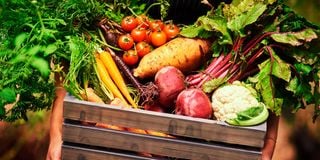
A crate full of fresh farm produce. PHOTO | SHUTTERSTOCK
The government is eyeing at least Sh14.3 billion in additional revenue in the proposed withholding tax of five percent on farm produce sold through co-operatives, a Business Daily tabulation shows.
This even as analysts fear the new tax measure, aimed at widening the tax-base, is likely to be counterproductive by pushing farmers to informal channels by selling their produce directly to consumers rather than through co-operative societies.
Official data shows that by the end of 2022, selected crops valued at Sh286 billion were sold through marketing boards, including co-operative societies and factories, which means they would have earned the State around Sh14.3 billion if the new tax measure was in place.
In the Medium-Term Revenue Strategy 2023 (MTRS)the government announced that in the three fiscal years from July to June 2027 it would apply a five percent withholding tax on all farm produce sold through co-operative societies.
Agriculture, the informal and digital sectors are some of the hard-tax areas that have been identified by the Treasury in the MTRS.
According to the Treasury, while agriculture’s contribution to the economy or the gross domestic product (GDP) is at 21.2 percent, its contribution to the tax revenue is less than three percent. This, the Treasury said, is an indicator that “the sector is undertaxed”.
The Treasury acknowledged some of the sector’s unique challenges for taxation, including being weather-dependent, perishability, its subsistence nature, and inadequate tax literacy.
“In addition, the sector is highly informal, cash-based and characterised by the notion that incomes generated from the sector are meagre and should not be taxed,” reads part of the report.
“To address these challenges, the Government will…introduce a final withholding agricultural tax rate not more than five percent of the value of the produce delivered to the cooperatives or other organised groups,” said the Treasury in the document that was published in September last year.
Farmer produce supplied to marketing boards will join winnings, qualifying interest, qualifying dividends and pensions, as among the few instances when withholding tax among the residents is a final tax.
Otherwise, withholding tax — in which a payer of certain incomes, for example payment for crop sale by a co-operative, deducts tax upon payments of certain incomes — is a final when deducted in relation to a payment made to a non-resident person with no permanent establishment in Kenya.
Tea, Kenya’s leading source of foreign exchange earnings, is most likely to be the largest contributor to this new tax pot giving the taxman Sh7.8 billion from total sales of Sh156.7 billion in 2022, according to figures from the Kenya National Bureau of Statistics. Most of this tea is sold to the Kenya Tea Development Authority.
Sugarcane, sold by farmers directly to factories, would have earned the country Sh1.97 billion, milk (Sh1.8 billion), coffee (Sh1 billion) and wheat (Sh543 million).
Timothy Njagi, a research fellow at Tegemeo Institute, an agricultural public policy think-tank affiliated with Egerton University, said the move might encourage informality, with a lot of farmers, who are already grappling with high input costs, including transport, avoiding the formal market of co-operative societies and factories. “I think that this will likely backfire on the government, especially if you read together with the ETIMs requirements for agro processors,” said Dr Njagi.
The Kenya Revenue Authority (KRA), however, clarified that farmers and small traders will be using a new system aimed at showing transactions rather than generating and transmitting electronic invoices through the electronic Tax Invoice Management System (e-Tims).
Starting this month, the KRA has also been integrating e-Tims to other tax categories, which means if you want to declare a transaction as a business claim then you need to support it with an electronic tax invoice.
Robert Waruiru, a partner in charge of Tax & Regulatory at Ichiban Tax & Business Advisory, while agreeing that agriculture does not contribute its fair share of the tax revenue, reckoned that the new tax measure might be unfriendly.
“Don’t also forget that it can seriously distort supply chains with devastating consequences. Further, what is the practicality of a farmer installing eTIMS?” wondered Mr Waruiru.
The government targets to increase the ratio of tax revenue collection to GDP collection by five percent through the strategy period from July 2024 to June 2027, said Njuguna Ndung’u, the Treasury Cabinet Secretary.
“This will be achieved through: putting in place tax policies and administrative measures that support economic growth; improving efficiency in tax administration; expanding the tax base; and promoting equity and fairness in the tax regime,” said Prof Njuguna.







